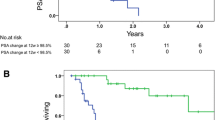Abstract
Introduction The changes in serum prostate specific antigen (PSA) concentrations can be used as a prognostic factor in patients undergoing maximum androgen blockade for metastatic prostate cancer. Material and method A total of 149 patients followed up in our department were classified into 4 groups on the basis of PSA changes: group 1; those with normalisation of PSA levels within the first 3 months, group 2; those with normalisation PSA between months 3 and 6, group 3; those with a decrease in PSA but not reaching normal range, group 4; those with no decrease. The gleason scores and the number of bone metastases were also compared between the groups. Result The time to progression was significantly delayed in group 1 (mean: 23.3 months) compared to those with group 2 (mean: 16.9 months) (P < 0.02). The time to progression in group 3 (mean: 8.45 months) was significantly shorter compared to the first two groups (P < 0.001). Also, in patients with gleason scores 5–7 (grades 2) and gleason scores over 7 (grade 3) and group 1, the time to progression (mean: 21.2 months) was significantly delayed compared to those with the same gleason scores but with group 2 (mean: 13.4 months) (P < 0.001). Conclusion The decrease in PSA level is more important than gleason scores in determining the time to progression. Early normalisation of PSA delays the time to progression, and when combined with gleason scores, PSA is an important prognostic factor in predicting the success of the therapy.
Similar content being viewed by others
References
Schubert J, Kowalik S (1994) The value of prognostic factors in prostatic cancer. Int Urol Nephrol 26:541–547
Kelly WK, Scher HI, Mazumdar M et al (1993) Prostate specific antigen as a measure of disease outcome in metastatic hormone refractory prostate cancer. J Clin Oncol 11:607–615
McCormack RT, Rittenhause HG, Finlay JA et al (1995) Molecular forms of prostate specific antigen and the human kallirein gene family: a new era. Urology 45:729–744
Arai Y, Yoshiki T, Yoshida O (1990) Prognostic significance of prostate specific antigen in endocrine treatment for prostatic cancer. J Urol 144:1415–1419
Matzkin H, Eber P, Todd B et al (1992) Prognostic significance of change in prostate specific antigen markers after endocrine treatment of stage D2 prostatic cancer. Cancer 70:2302–2309
Stamey TA, Kabalin JN, Ferrari M (1989) Prostate specific antigen in the diagnosis and treatment of adenocarcinoma of the prostate, IV Anti androgen treated patients. J Urol 141:1088–1090
Zanetti G, Trinçhieri A, Del Nero A et al (1992) Prognostic significance of prostate specific antigen in endocrine treatment for prostatic carcinoma. Eur Urol 21(suppl 1):96–98
Miller JI, Ahmann FR, Drach GW et al (1992) The clinical usefulness of serum prostate specific antigen after hormonal theraphy of metastatic prostate cancer. J Urol 147:956–961
Furuya Y, Nagakawa O, Fuse H (2003) Prognostic significance in sort-term prostate volume and serum prostate specific antigen after androgen withdrawal in men metastatic prostate cancer. Urol Int 70(3):195–199
Dubruyne FM (1996) Combined androgen blockade is the treatment choice for patients with advanced prostate cancer: the argument for. Eur Urol 29(suppl 2):34–36
Oosterlinck W, Mattelaer J, Casselmam J et al (1997) PSA evolution: a prognostic factor during treatment of advanced prostatic carcinoma with total androgen blockade. Data from Belgian multicentric of 546 patients. Acta Urol Belg 65(3):63–71
Fowler JE, Prabhakar P, Seaver LE et al (1995) Prostate specific antigen regression and progression after androgen deprivation for localized and metastatic prostatic cancer. J Urol 153:1860–1865
Author information
Authors and Affiliations
Corresponding author
Rights and permissions
About this article
Cite this article
Kiper, A., Yiğitbası, O., Imamoglu, A. et al. The prognostic importance of prostate specific antigen in the monitorisation of patients undergoing maximum androgen blockade for metastatic prostate cancer. Int Urol Nephrol 38, 571–576 (2006). https://doi.org/10.1007/s11255-006-0096-0
Received:
Accepted:
Published:
Issue Date:
DOI: https://doi.org/10.1007/s11255-006-0096-0




